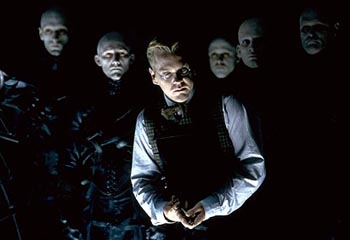Cold Comfort Future
Urban Blight: Kiefer Sutherland inhabits a future world manipulated by floating aliens in Alex Proyas' 'Dark City.'
Identity and reality get shuffled in 'Dark City'
By Zack Stentz
A WEEK AFTER seeing Dark City, I'm still not sure if I enjoyed it, but I'll grant this about director Alex (The Crow) Proyas' exercise in techno-baroque film noir: it's by far the weirdest big-budget sci-fi film to come along since John Boorman's Zardoz.
The opening is a tip-off that the studio wasn't sure what to make of Dark City either; a baritone voice-over about reality-manipulating aliens smacks of being inserted at the last second after test audiences couldn't follow the film's willfully convoluted story.
I wish they had left the explanation out, because it diminishes the thrill of the unexpected that suffuses Dark City's first hour, as a conventional film noir setup (an amnesiac man wakes up in a hotel room next to a dead prostitute) mutates into frightening weirdness as the hero (Cold Comfort Farm's Rufus Sewell) struggles to reconstruct his memory while dodging a world-weary detective (William Hurt), a mad psychiatrist (Kiefer Sutherland) and a posse of trench-coated aliens who float through the air and bend reality with the force of their thoughts.
Raymond Chandler gives way to Philip K. Dick as protagonist John Murdoch (if that's his real name--his few memories and past appear to have been invented) discovers that the city he lives in is actually a construct of the aliens called the Strangers, who rearrange the buildings, furniture and identities of the inhabitants as part of a long-running experiment on the nature of human individuality.
Every evening at the stroke of midnight, the Strangers (who live in a Metropolis-inspired underground lair and look like the bastard offspring of Uncle Fester and the Cure's Robert Smith) stop time and float through the city, rearranging the landscape and altering, erasing and exchanging the memories of their puny mortal victims. Only John is immune to the Strangers' powers, and his efforts to make sense of the bizarre events occurring around him form the spine of the narrative.
By far the best part of Dark City is the look of the eponymous metropolis, which is equal parts The City of Lost Children, Edward Hopper's Nighthawks and the grubby postwar London of the Quatermass series of British science-fiction films. The visual sheen shouldn't come as a shock, given Proyas' background as a music-video director. But glossy-looking films with arresting images out of a Marilyn Manson video are commonplace in a Hollywood where directing a three-minute video is deemed a suitable apprenticeship for helming Con Air.
What's far more welcome is Proyas' attempt to make a science-fiction film with more on its mind than killing aliens or returning from the grave to avenge one's death. Mixed in with all the chase scenes and retro-Gothic visual flourishes are some weighty ruminations on human identity and the elusive nature of external reality.
Without reliable memories, does a person still have anything resembling a soul? And in Murdoch's case, does a man implanted with the memories of a murderer then become that killer? Proyas' conclusions and ultimately optimistic view of human nature stand in sharp contrast to the atmosphere of doom and gloom.
Dark City unfortunately succumbs to the action-movie imperative to Blow Everything Up, and the film ends on a disappointingly conventional note. But in the 80 minutes that precede the climax, Proyas makes a case for himself as the bearer of intelligent science-fiction cinema's guttering flame (so heavily pissed on by Independence Day and Starship Troopers).
If Proyas keeps up the good work, his next project--an update of science-fiction's brainiest, spookiest film, Quatermass and the Pit (a.k.a. Five Million Years to Earth)--might actually be a remake worth seeing.
[ San Jose | Metroactive Central | Archives ]
![]()

Jasin Boland
Dark City (R; 103 min.), directed by Alex Proyas, written by Lem Dobbs, David S. Goyer and Proyas, photographed by Dariusz Wolski and starring Rufus Sewell and Kiefer Sutherland.
From the February 26-March 4, 1998 issue of Metro.
![[Metroactive Movies]](/movies/gifs/movies468.gif)